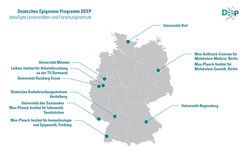Mapping Human Epigenomes
The International Human Epigenome Consortium (IHEC) and the German Epigenome Program (DEEP) celebrate a major coordinated paper release with more than 40 articles published in Cell, CellPress-associated magazines and other well-known journals. The publications shed light on different aspects on how epigenetic information and analyses can help find answers to pressing questions related to the cellular mechanisms associated with complex human diseases. Primary goal of the research consortia is giving free access to high-resolution reference human epigenome maps for normal and disease cell types to the research community. Collecting and publishing the results of the research efforts so far represents a major step forward for the field of epigenomics. Max Planck scienstists from MPI-IE, Freiburg are also among the project partners.
Our body consists of a variety of different cell and tissue types, although the genome in the nucleus of all of this cells is actually the same. Today scienctists know that the so-called epigenome is responsible for this diversity. These are molecular regulatory mechanisms that determine which genes are read and which are mute, depending on tissue and function. The comprehensive analysis of the epigenomes of healthy and abnormal cells will help to understand cell-fate decisions and also facilitate new ways to diagnose and treat various diseases, and ultimately lead to improved health outcomes.

The German Epigenome Program (Deutsches Epigenom Programm, DEEP) is an interdisciplinary network of biomedical research groups consisting of leading German universities, institutes of the Max Planck Society and other partners. Started in 2012 DEEP will generate 80 human and mouse reference epigenomes in primary cell and tissue types in normal and diseased states until 2017. This data on the epigenetic regulation or misregulation of cells will shine a light on the underlying regulatory processes that have proven resistant to analysis by conventional genomic approaches and will contribute to a better understanding of complex diseases such as obesity, cancer or autoimmune diseases. The epigenome maps are make publicly available to the scientific community for future research. Thus, DEEP is Germany’s contribution to the International Human Epigenomic Consortium (IHEC), which coordinates the mapping of more than 1000 epigenomes around the globe.
The research groups of Thomas Jenuwein (project on Genome-wide histone modification maps) and Andrew Pospisilik (project on circadian epigenetic variation concerning heterochromatin, stochastic obesity and metabolism) of the Max Planck Institute of Immunobiology and Epigenetics in Freiburg are part of DEEP. Likewise, the research units for bioinformatics and deep sequencing of the institute made an important contribution to the entire DEEP project by participating as one of six analysis centers in Germany. They generated high-quality reference epigenomes starting from different and challenging tissue samples provided by the project partners. To ensure accurate, comprehensive and reproducible epigenomic studies the teams at the MPI-IE not only established new experimental protocols (NEXSON) but also developed powerful software programs (deeptools). With these tools they provided a comprehensible and easy-to-use framework for researchers seeking to generate, visualize and interprete epigenomic data.
Now the scientists of IHEC have collected the results of the mapping efforts so far and published an extensive collection of 41 articles in prestigious international journals. Among these are also publications of the DEEP network with participations of MPI-IE researchers who generated the epigenomic data. Overall the publications highlight various aspects of epigenetic control in human cells such as fundamental questions on how the environment interacts with us, during development and ageing, to influence health and disease. A number of the publications deal with the epigenetic basis for the development of healthy and diseased cells in particular, while further articles are focused on approaches and methodologies to the generate and analyze epigenomic data.
The entire collection of IHEC publications is available here: http://www.cell.com/consortium/IHEC. You can find further information on the specific papers in the official press releases by IHEC and DEEP (German)
